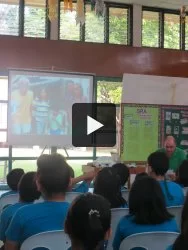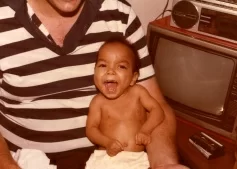 without a thought on my part. But Luke came to my mind yesterday and I looked up some information on him and discovered that his birthday had just passed. I found this old article that I wrote about Luke a few years ago. I thought I'd share it again. I am convinced that there are important and significant lessons we can learn from his life, and that I need to regularly share what I think they are. I hope you enjoy this!
without a thought on my part. But Luke came to my mind yesterday and I looked up some information on him and discovered that his birthday had just passed. I found this old article that I wrote about Luke a few years ago. I thought I'd share it again. I am convinced that there are important and significant lessons we can learn from his life, and that I need to regularly share what I think they are. I hope you enjoy this!The mysteries of God are a part of the Christian life that can often lead to confusion, doubt and even discouragement for believers.
- For some, it's a pride thing. We want to have answers – we want to understand, to be able to grasp the complexities of Biblical truth and God's plan for mankind.
- For some, God's mysteries – the unexplained things of life – are stumbling blocks to faith:
1. Why do bad things happen to good people?
2. Why does He allow pain, suffering and evil to thrive in our world?
Several months ago we were witnesses to the aftermath of the tragedy in Pennsylvania involving the Amish community, where, good, decent, hard working, non violent people were subjected to unspeakable cruelty towards their children. How can this happen?
3. One of our CSC children, who grew up in the worst poverty imaginable in Cebu City, was adopted into a family in the United States several years ago. Well meaning people would tell her how lucky she was and how God obviously had a wonderful plan for her life. She had a hard time with that and would sometimes ask her parents, "But what about all the kids who are still there, who weren't adopted, and who are still suffering and dying? What is God's wonderful plan for their lives? Why me and not them?
For many of us, we celebrate the goodness of God in our lives, we praise him for his healing, for material comforts, for blessing our efforts – even as we observe people who remain sick or disabled, who suffer in poverty – those who efforts and initiatives end in disappointment and ruin.
There are two extremes in terms of people's reactions to the things about God and life that are not understood.
1. There are those who try in vain to grasp the ungraspable – to be able to reduce the mysteries to understandable formulas or explanations. I remember a young seminarian who came to Cebu and who filled the pulpit of our church on a Sunday evening. He preached for an hour on the "peace of God that passes all understanding." Perhaps he felt that if he preached long enough he could crack that nut and open our understanding!
We all know those who have reduced the book of Revelation to precise charts and timetables, giving us easy to understand categories for all of human history and, most especially, the times to come.
2. A second category are those who shake their heads and say, "We'll only know these answers when we get to heaven." They suspend inquiry, not bothering to seek answers to the perplexing questions of life.
Living and working in a Third World country like the Philippines brings some of these mysteries to the front of our lives. Poverty, and all that goes with it, is "in your face." People often ask me "How do you like living in the Philippines?" That's a tough one to answer. Life anywhere has its highs and lows. Some days are great, others are difficult. I often answer this way:
1. When I'm sitting down to a nice breakfast I am aware that, within a few meters of my house are families that have no breakfast.
2. When I'm driving to the office or the Shelter I often pass people walking along the road who, for lack of a few cents can not even afford public transportation and must walk.
3. When I stop to buy medicine for my family or the CSC kids, there are people standing nearby whose children are dying for lack of that very same medicine.
Why am I blessed and they are not?
I recall a conversation with a missionary a few days after Cebu was hit by a strong typhoon. Many of our CSC workers lost their roofs or their entire homes. The houses of the poor were devastated by the high winds and torrential rains. The missionary said that it had been such a miracle how God spared the missionary homes from damage, holding his hands of protection around us during the storm. I remember wondering whether it wasn't more a matter of our having cement houses and strong metal roofs.
Why did our CSC kids have to suffer so much? And how much more, those who live on the street and cannot be admitted to CSC?
These are tough questions. When it comes to trying to understand our own suffering, the Bible gives some answers. For example, Romans 5:3-4 tells us that suffering produces perseverance, perseverance character, and character, hope. And the Bible gives us additional hope that we will someday come to see God's purpose and mysteries:
"But now we see through a glass dimly, but then face to face."
And we hear the testimonies of Christian brothers and sisters who have lived through terrible times and have turned negatives into positives in their lives.
Several months ago I was attending a conference in Bismark, North Dakota. One of the featured speakers was Steve Saint, Steve's father, Nate Saint, was one of the five missionaries killed in 1956 by Aucan warriors in Equador. Steve told about what that tragic day meant to his family, and what it was like when his dad, his hero, didn't come home that day. We saw video of his current family life, and saw a man who was interacting with Steve's children, and who was being referred to as "Uncle." It turns out that this was the very man who had killed Steve's father, who had come to know Jesus and had experienced the forgiveness of God and of the Saint family and now was a part of their family – an amazing story of how good things had come out of tragedy and suffering.
So the clear message is that God has a plan for our lives, we will discover that plan in the right time. He is writing our life's stories, but some of the chapters are difficult ones.
We can understand this. We can, when aided by the Holy Spirit, see how difficulties and suffering are part of a purification process for us, and that we, like Job, will eventually be better people for it.
But what about people who, because of major disabilities, are unable to understand their situation, unable to discern the hand of God or his plan for their lives. Where is the purification and growth and ultimate value for these people? What could God's purpose possibly be?
Back on 1982 a baby was born in a charity ward in a small hospital in Cebu City. 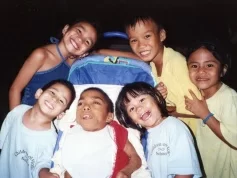 The baby underwent cardiac arrest during birth and was without oxygen for an extended time. Unlike many cases of charity patients, the hospital staff decided to resuscitate the baby, even after he had suffered massive brain damage and cerebral palsy. The baby's mother abandoned him in the hospital, and after a couple months Luke was referred to CSC. When we took him in he appeared to be a bouncing baby boy. We did not know that he would not develop physically beyond about a year and a half, or mentally beyond a few months. Luke would never speak, nor have voluntary movement of his arms or legs.
The baby underwent cardiac arrest during birth and was without oxygen for an extended time. Unlike many cases of charity patients, the hospital staff decided to resuscitate the baby, even after he had suffered massive brain damage and cerebral palsy. The baby's mother abandoned him in the hospital, and after a couple months Luke was referred to CSC. When we took him in he appeared to be a bouncing baby boy. We did not know that he would not develop physically beyond about a year and a half, or mentally beyond a few months. Luke would never speak, nor have voluntary movement of his arms or legs.
Luke became a fixture at CSC. For over 23 years he was an integral part of our lives and a symbol of CSC and what we are all about.
Many times Luke would be hospitalized – often due to upper respiratory infections. He fought for his life many times. There were at least a dozen times when we were sure that he would die. The doctors had told us that he wouldn't make it past five years old. Then they revised it to nine, then 11 – certainly he wouldn't reach his teenage years.
One time, when Luke was critically ill our staff met to pray and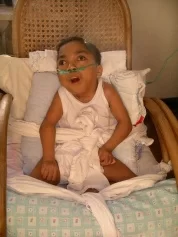 I asked them to reflect on his life. Here is why: I believe that God had a purpose for Luke's life when he created him. I believe that He uses people like Luke to teach us important things. But here is the rub: If we don't spend time reflecting on these lessons, then Luke's life is useless. Its up to us to allow God to make sense of Luke's life.
I asked them to reflect on his life. Here is why: I believe that God had a purpose for Luke's life when he created him. I believe that He uses people like Luke to teach us important things. But here is the rub: If we don't spend time reflecting on these lessons, then Luke's life is useless. Its up to us to allow God to make sense of Luke's life.
And what are the lessons that we found? What has God taught us through his life?
1. First, life is precious. Even though he had nothing to live for, from the world's point of view, Luke clung to live almost ferociously. Some of us who have much more to live for take life casually, we take life for granted. Not Luke. Every day was a struggle. Every breath had to be fought for. Life is a gift from God and we should treat it carefully.
2. God has provided us with opportunities, through Luke's life, to minister to him in significant and life-saving ways. He has provided an avenue for us to live out the biblical mandate to minister unto the "least of these," because, truly, Luke was in that category. Hundreds of people have been given a blessing to participate in the support of CSC that reaches out to children like Luke and many others with other special needs.
3. In so doing, He has given us a chance to show others a Godly value system that doesn't reserve love and attention for those who have something to give back, or who have "potential" or a bright future. For many people who live in a developing country, where resources are limited, this has been a difficult lesson to learn. How could we justify spending so much money for Luke's hospitalization when other, "normal" kids needed care? Luke's life gave us the opportunity to teach about the value of life and about how God looks at all of us.
4. Luke has been a tremendous ambassador for CSC. People around the world remember observing the loving care that he received by our staff and workers. They remember his famous smiles. They may quickly forget the names of the staff or other children, but they remember Luke. "How's Luke doing?" we get asked wherever we go to talk about the ministry of CSC. And our care of Luke helps us explain the true nature and core values of our work in the Philippines.
5. Luke has been a safety valve for those that had an opportunity to know him. My job as Field Director of CSC involves lots of administrative chores, like making budgets, government relations and various kinds of problem solving. There are days when I get stressed out and start to feel the weight of the world on my shoulders. But all I needed to do is to drive a few short miles to where Luke lived, to hold him in my arms, and I get a clear picture of what real struggles are all about. My struggles paled in comparison to what Luke faced every day. Self pity may be easy for some people, but those that knew Luke have no excuse for feeling sorry for themselves. What a great gift that was to all of us.
A little over a week before we left Cebu, Marlys called me on my cell phone and told me that I should get to the hospital quickly, as Luke wasn't doing well. He had been hospitalized for over a week and his breathing was bad. I had gotten messages similar to this one throughout Luke's life, so I went to the office and took care of a few things. But the Lord laid it on my heart to go see Luke and when I entered his room his breathing was extremely labored. He looked different than I had ever seen him, and it became clear that he was dying. I sat down next to him, kissed him and looked into his eyes. For 23 years we had loved this boy. It wasn't easy to say goodbye. I said to him, "Luke. You can go. Go to be with Jesus, Luke. I love you." Within a couple of minutes Luke took his last breath. 23 years of pain, suffering, limitations, hospitalizations, forced breathing, skin rashes and infections were over. We would never see Luke's smile again.
As Luke was dying in that hospital room, I made a promise. I'm not sure if I was making a promise to Luke, to God or to myself. But I decided then and there that I was going to talk about Luke on our coming furlough. I believed then and do now, that the church of Jesus Christ needs to hear about Luke, that the lessons of his life are important ones. Many Americans are complainers - full of self pity. People who have so many material comforts are unsatisfied. American discourse is increasingly a chorus of victim and entitlement claims. Charles Sykes, in his book "A Nation of Victims: The Decay of the American Character" states that, "in a nation where everyone is a victim, no one is a victim." In our preoccupation with our own needs we have a hard time seeing the needs of others – people like Luke.
In his song "God Help the Outcasts," the Hunchback of Notre Dame poses several difficult issues:
I don't know if there's a reason
Why some are blessed, some not
Why the few You seem to favor
They fear us, flee us,
Try not to see us.
The first part we have already examined. The second is our call to arms. "Why the few You seem to favor, they fear us, flee us, try not to see us."
I don't know what factors might make it difficult for us to see the needs of society's outcasts. Perhaps we are too busy. Maybe our personal and church calendars are so full that there just isn't room for Luke, or the man who had fallen to thieves at the side of the road, to break into our day. Maybe we are numbed or fatigued by the needs of others, or simply overwhelmed by the circumstances of our own lives. Maybe we have become cynical. "Why did that guy travel this road at this time carrying that amount of money? He deserves what he got!"
Maybe, just maybe, Luke can help cut through the apathy, the self-centeredness and cynicism of our lives. He was a person with significant needs that he didn't cause. He was totally dependent on others to live. His life had none of the possibilities and opportunities that we take for granted every day. He needed us so very much. Maybe Luke can serve as a symbol of many others that we come into contact with. Maybe Luke can help us rescue our lives.
Party Party Party
There are many parties at CSC in December. December 5 was the CSC workers party. A fun evning of games, prizes, a short meditation, food and fun was had by everyone.
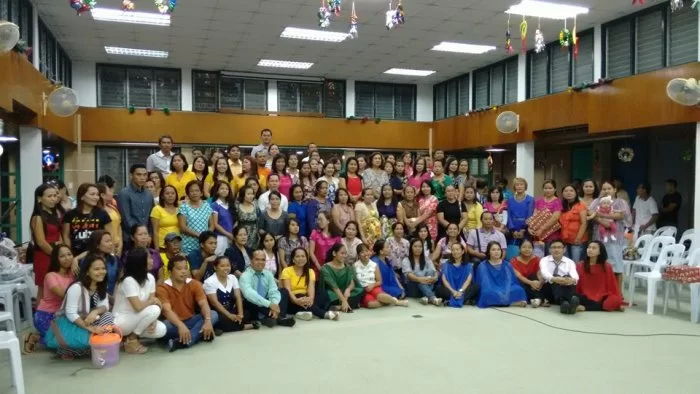
Saturday December 11, was the CSC Outreach party. Many former CSC residents came for an afternoon of games, a gift from Santa Claus, singing of Christmas carols, hearing the Christmas story and a meal from Jollibee. It's always fun to see some of our former CSC kids and their families.
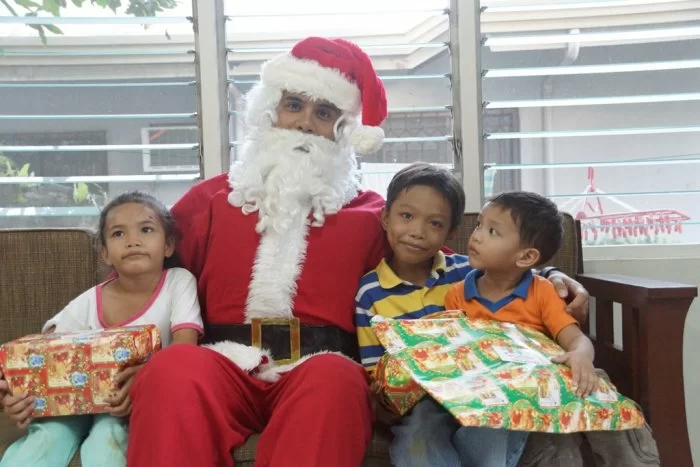
There are still many upcoming CSC parties! The individual department parties, the school program, progressive dinnner, Christmas Eve and Christmas day activities.
Thank you to everyone who helps make the Christmas Season so special for all of the CSC kids and workers.
Haircuts
With a house full of kids, what to do about haircuts? The solution is simple. Bring the barbershop to the house.
Many Saturday mornings at the shelter, a barber shop is set up somewhere near one of the homes. A local barber brings his tools of the trade and spends the morning snipping, trimming, cutting, and buzzing. This past Saturday the Duterte boys all got a trim.

Giving generously and with a cheerful heart
The Christmas decorations are up and holiday tunes can be heard wherever you go! It is almost Christmas, only 15 days away! One of my absolute favorite CSC Christmas events is Junel's box. Maybe you have already heard the story, but for those of you who haven't...
Junel used to live at CSC. His generous spirit was his legacy and it inspired a wonderful CSC tradition. Before coming to CSC, Junel was not treated very well in his previous home. He was not allowed to eat with the rest of the members of his household and he was only able to eat if there was food left over. When he came to CSC, he expected it to be much the same. When it was mealtime, he went and sat in a corner instead of in a chair at the table, where all of the other children were. He needed reminders that he was just as special and loved just as much as the other CSC children.
Junel's most prized possession seemed to be a small film canister with a few coins in it. He loved to shake the canister to hear the coins jingle and he did so frequently! That noise signaled his caregivers of his presence and it became part of the background noise in the home. It was so much a part of the din that one day when it was not heard, the caregivers became concerned. "Where is Junel?! He should be upstairs! Everyone is home from school!" The caregivers rushed upstairs and sure enough he was there, and so was his canister, but it no longer made any noise. It was empty.
In school that day, Junel's teacher had told the story of children on another island not having any slippers to wear on their feet. He was so moved and compelled to help them that he gave all of his money, every last coin, each "noise-maker" he had.
Sacrifice. Giving everything you have. Giving what you cherish the most. That is truly what this season is all about.
"For God loved the world so much that he gave his one and only Son, so that everyone who believes in him will not perish but have eternal life. God sent his Son into the world not to judge the world, but to save the world through him." John 3:16-17
Every year at this time, all of CSC's children hear the story of Junel. For some of them they have heard it before, but for many, it is a story they are hearing for the first time. For children new to CSC, they are not so far away from the life they lived before. They can still remember begging on the street, or when their stomach hurt so much because it had been so long since they had eaten. They have vivid memories of being in need. The kids hear the story of Junel and then they hear of a family in their community that needs help. They see pictures of the family and the home. Maybe they see themselves. The kids are then told they have the opportunity to give money from their allowance to help that family this Christmas. The contributions will be used to buy food, and other household items to meet the needs of the family. The family this year needs a home so if enough funds are raised, building materials could be purchased.
Every year, I am astounded at the generosity of our children. So many of them, when told how much money is in their bank and asked how much they would like to give say, "Tanan." Meaning everything. They will give it all. And they do so with big smiles on their face.
For they were once in need and now they can help others. 'Tis the season, indeed. Merry Christmas!
Tree of History
The Christmas tree is up at the school. The kids use their pictures to make star ornaments for the tree. New and old ornaments hang and twist in the breeze.
The many pictures draw in the kids. The kids like to see how they have changed and grown from their ornament pictures of past years.
On this one side of the tree there is a kid who has been at CSC 14 years, the next star ornament is a kid who arrived last month, and so many others in between.
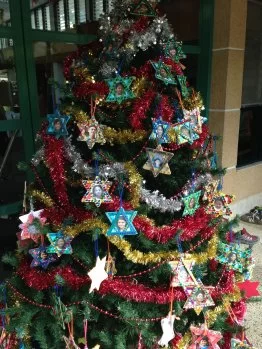 The kids can
see a part of their history on this tree.
The kids can
see a part of their history on this tree.
Big Hearts
CSC loves making new friends, and we made a few yesterday. I received an email about two women who were interested in visiting us in Cebu and learning more about shelter work in the Philippines. They feel called by God to explore this and potentially start a shelter. I got to spend some time talking with them.
It was a very exciting conversation! I was asked a lot of questions about how we do our work. Their hearts were big, but I was especially thrilled to learn about the careful consideration with which they are approaching this idea. According to my limited wisdom, Cebu could certainly use more people who are working to benefit the poor but that doesn’t mean it’s what God has in store for these two ladies. Big hearts can sometimes become so excited to give that they begin to serve because of what they get out of it, or because the need seems so great, instead of because God deserves the glory of our service. It’s okay to feel good serving others and the need is HUGE, but the point behind any ministry should be to bring glory to God. A big heart is an amazing first step. Being patient, listening carefully, and working hard in order to learn and grow are next steps.
It was an honor to be part of the next steps with our two visitors yesterday. I hope they will continue to listen to God and follow the path he has for them. Maybe that’s to Cebu!




